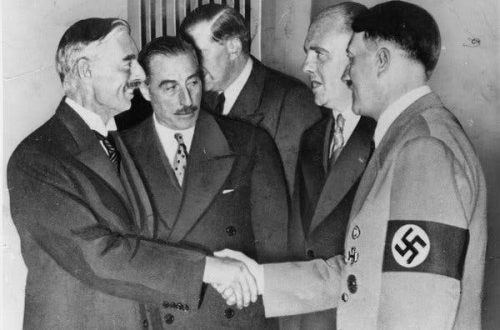There is no getting round the fact that over 100,000 people and possibly as many as 200,000 died as a result of the dropping of the atomic bombs on Hiroshima and Nagasaki, most of them innocent civilians. People are entitled to their own moral judgement on these acts, but that does not mean to say that the historical record should be distorted to justify a preconceived moral position against the bombs. The purpose of this revisionism is to deny the bombs were necessary to end the war. I do not wish to delve into all the revisionists’ claims here, but I am moved to write because the political commentator Mehdi Hasan recently went on a two minute rant with an argument promoting certain claims of the revisionists [1]
1. CLAIM: OPPOSITION TO THE BOMBS BY LEADING US MILITARY FIGURES
Hasan asked “Did you know that a number of leading US military and political figures at the time were hugely critical of President Harry Truman’s decision to nuke the Japanese?” The video then posts a list of numerous of these figures.
1. TRUTH
There is no evidence that any of the people listed, including Dwight Eisehower, criticised the moral decision before the bombs were dropped: they announced their reservations later, in some cases many years later. [2] To show how distorted Hasan’s claim is, among others, the following people’s names are mentioned as those who were critical of the decision: Chester Nimitz, Curtis Lemay and Carl Spaatz. All three of these people not only did not oppose the decision to drop the bombs at the time, they each recommended that a third atomic bomb was used on Tokyo.[3]
2. CLAIM: JAPANESE SURRENDER WAS IMMINENT
Hasan promotes the idea put forward in the post-war produced United States Strategic Bombing Survey (USSBS) that “Japan would have surrendered even if the atomic bombs had not been dropped.”
2. TRUTH
The cited conclusion of the USSBS was a speculative one. The narrative of the survey suggests that the atomic bomb and Soviet entry to the war was more critical in forcing Japan to surrender. Testimonies from key Japanese leaders supported the possibility that war would have dragged on much longer. “The survey authors, however, chose not to use this testimony; evidence that challenged their conclusions stayed in their unpublished files.” [4] Moreover, the compliers of the USSBS failed “to obtain and use the massive pre-surrender intelligence gathered” that pointed to a different conclusion. [5] In a detailed look at the USSBS and its omissions, the historian Robert Newman concluded that “there is no basis” for the USSBS claim: “No one can ever know how long the war would have gone on.” [6].
3. CLAIM: IT WAS SOVIET ENTRY INTO THE WAR AGAINST JAPAN, NOT THE ATOMIC BOMBS THAT CAUSED JAPAN TO SURRENDER
Hasan promotes the idea that Tsuyoshi Hasegawa espoused in his 2005 book, “Racing the Enemy: Stalin, Truman and the Surrender of Japan,” (Harvard University Press, 2005) that it was Soviet entry into the war, not the atomic bombs that caused Japan to surrender
3. TRUTH
The evidence does not back up Hasegawa’s claims. As I have previously written on this point, complete with numerous references, to save time, I will just direct anyone interested to my own post. [7]
4. CLAIM: THE BOMB ON NAGASAKI WAS UNNECCESSARY EVEN IF HIROSHIMA WAS NECESSARY
Hasan promotes the idea from Barton Bernstein that the second atomic bomb, the one dropped on Nagasaki, was unnecessary.
4. TRUTH
There are numerous contemporaneous statements from officials in Japan that suggest that the dropping of the bomb on Hiroshima was not sufficient to end the war. For reasons of time and space, I cannot quote them all here, but I will detail one. Hayashi Saburo was the military secretary to Anami, the Japanese minister of war. He argued that while the Hiroshima bomb was formidable, the Japanese military believed that they had counter measures against it. Notably, Truman’s broadcast claiming that the bomb was atomic was rejected by the Japanese military as “strategic propaganda directed against Japan.” It was not until the second bomb was dropped that “City dwellers were gripped with great fear that their own communities might become the next target.” It was “the psychological effect” of this that led to sentiment of the Japanese to surrender.[8]
CONCLUSION
Hasan is not the first and I doubt he will be the last commentator to engage in Hiroshima revisionism. The problem is that it distorts the historical record. It is, in other words, a travesty.
ENDNOTES
[1] http://www.aljazeera.com/programmes/upfront/2016/05/160527123703623.html [From 12 minutes and 15 seconds in to 14 minutes and 38 seconds].
[2] Barton J. Bernstein, “Ike and Hiroshima: Did he oppose it?” Journal of Strategic Studies, Vol. 10, No. 3, 1987, pp.386-387.
[3] Robert James Maddox, “Weapons for Victory: The Hiroshima Decision,” (University of Missouri Press, 2004), p.143.
[4]Gian Peri Gentile, “Advocacy of Assessment? The United States Strategic Bombing Survey of Germany and Japan,” in Robert James Maddox (Ed.), “Hiroshima in History: The Myths of Revisionism,” (University of Missouri Press, 2007), p.123.
[5] Robert P. Newman, “Truman and the Hiroshima Cult,” (Michigan State University Press, 1995),p.55
[6]. Ibid. p.56.
[7]. http://hurryupharry.net/2011/08/12/hiroshima-revisionism-again/
[8.] Newman, “Truman and the Hiroshima Cult,” Op. cit., p.110. NB Truman denotes a whole chapter to the question of the necessity of the second bomb. (pp.105-113.) See also Sadao Asada’s essay “The Shock of the Atomic Bomb and Japan’s Decision to Surrender: A Reconsideration,” Pacific Historical Review Vol. 67, No. 4, (November 1998) pp. 477-512.


